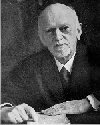- THE AXIOMATIC -- initiated by Thales of Miletus (c. 624-547BC) for his geometry;
- THE GENERATIVE -- initiated by Thales' pupil, Pythagoras of Samos (c. 580-496BC), for his arithmetic;
- THE GROUP-THEORETIC -- initiated by German mathematician, Felix Klein (1849-1925), ostensibly to found all of mathematics.
The axiomatic approach is "top-down", while the generative is "bottoms-up". As such, it is pedagogically best to start with the generative (which connections with everyday experience and with many of the sciences), then condense via the axiomatic. For, you can get to the axiomatic from the generative, but not conversely. But I don't know where -- apart from my own work -- this is done.
As a second opinion, I quote the distinguished mathematician-philosopher, Bertrand Russell (1872-1970): "The axiomatic method has all the advantages over the generative that theft has over honest labor."
 The axiomatic basis was defended by the great German mathematician,
David Hilbert (1862-1943), who formulated the first satisfactory set of axioms for Euclidean
geometry. In particular, Hilbert defended the dependence of axiomatics on nonconstructive
proofs.
The axiomatic basis was defended by the great German mathematician,
David Hilbert (1862-1943), who formulated the first satisfactory set of axioms for Euclidean
geometry. In particular, Hilbert defended the dependence of axiomatics on nonconstructive
proofs.
The works of Euclid have been published more than any other book except The Bible, skewing our curricula in schools and creating bias.
